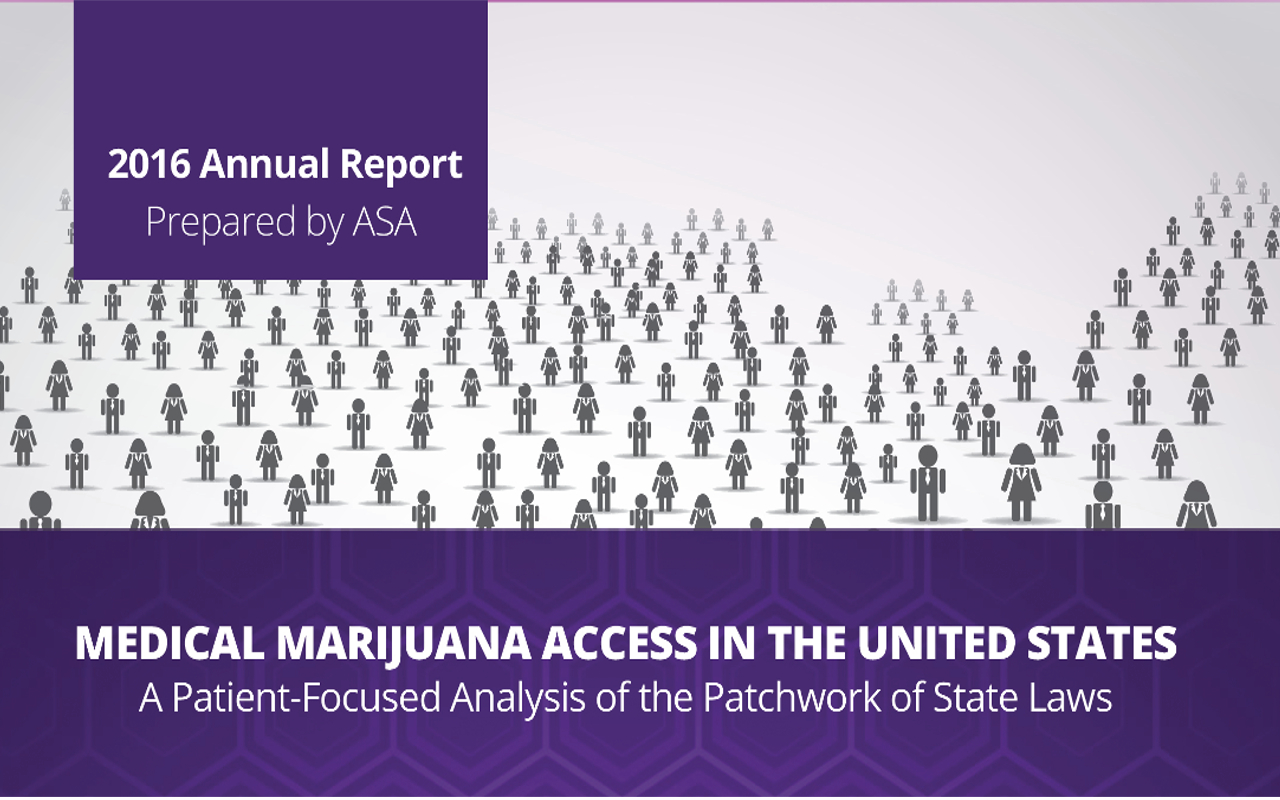(Washington, D.C.) – Americans for Safe Access (ASA) issued “Medical Marijuana Access in the US: A Patient-Focused Analysis of the Patchwork of State Laws,” today. The annual report evaluates the array of differing state medical cannabis programs across the country from a perspective often overlooked in policy debates: the patients’ and provides policy makers with model legislation and regulations. With dozens of states already seeing legislative and regulatory proposals in 2016, this groundbreaking report will provide state lawmakers with timely tools they need to improve their medical cannabis programs to truly meet the needs of the patients they are meant to serve.
Eighty-one percent of Americans favor the legalization of medical marijuana according to a May 7, 2015, Harris Poll. This broad support has led to unprecedented progress in state medical marijuana programs in 2015. Nineteen states introduced legislation to legalize medical marijuana during the year. In addition, many of the twenty three states with current medical marijuana laws passed legislation to expand or improve their programs in 2015, including New Jersey, New Mexico, New York, Connecticut, Oregon, California, Washington, Maryland, Hawaii, Illinois, Delaware, and the District of Columbia. Other states, like Nevada and Vermont, expanded and improved their programs through new regulations.
This report comes at a perfect time to inform improvements to existing medical marijuana programs and guide legislators who are creating or expanding laws and programs. “Too often, patients are denied life-saving treatments solely because they are using medical cannabis,” said California Assemblymember Marc Levine, champion of the Medical Cannabis Organ Transplant Act (AB 258), “It is imperative for state lawmakers to take advantage of vital resources like ASA’s report to improve their state programs.”
The report uses a point system to grade each medical marijuana law on: 1) patients’ rights and protection from discrimination, 2) access to medicine, 3) ease of navigation, 4) functionality, and 5) product safety protocols. The report found that while many states have important elements helpful to patients, no state has yet established an ideal, comprehensive program.
The most notable trend in 2015 was the adoption and implementation of comprehensive product safety regulations. With Maryland’s medical marijuana program projected to begin serving patients in 2017, the state received the highest grade for product safety by working with ASA to combine its own stringent safety and quality control measures with those of the American Herbal Product Association’s (AHPA) Recommendations to Regulators in the areas of: cultivation, distribution and manufacturing. “The tools provided by Americans for Safe Access and the Patient Focused Certification program have been tremendously helpful in creating product safety regulations that will ensure Maryland patients are receiving the highest quality products and medicine possible” said Hannah Byron, executive director of the Natalie M. LaPrade Maryland Medical Cannabis Commission.
Maryland is not the only state adopting the best practices and AHPA recommendations and standards. New Hampshire, New Mexico, and Washington have also done so. Michael McGuffin, President of AHPA, notes, “The report highlights how best practice guidance such as the Cannabis Committee’s Recommendations to Regulators documents can assist states in establishing regulations that ensure the quality and safety of cannabis products.”
The report takes a patient-centered approach, evaluating programs on how effective they are in meeting patients’ needs. ASA is asking their members to share the report with their state representatives. “With the increased interest in medical cannabis access around the country, it is imperative that we ensure that new and existing programs adopt regulations and standards that provide patients with safe medicine while protecting their rights,” said ASA Executive Director Steph Sherer. “This report will help policymakers create and maintain programs that put the patients first.”
Letter-grades for all 23 state laws and Washington, D.C.: Alaska (D-), Arizona (B-), California (B+), Colorado (B), Connecticut (C+), Delaware (C), Hawaii (B), Illinois (B+), Maine (B-), Maryland (B), Massachusetts (B), Michigan (D+), Minnesota (C), Montana (D-), Nevada (B), New Hampshire (C), New Jersey (C), New Mexico (B+), New York (C), Oregon (B), Rhode Island (C-), Vermont (D+), Washington (B), and the District of Columbia (C).
Further Information:
2016 State of the States Report: Medical Marijuana Access in the U.S.
